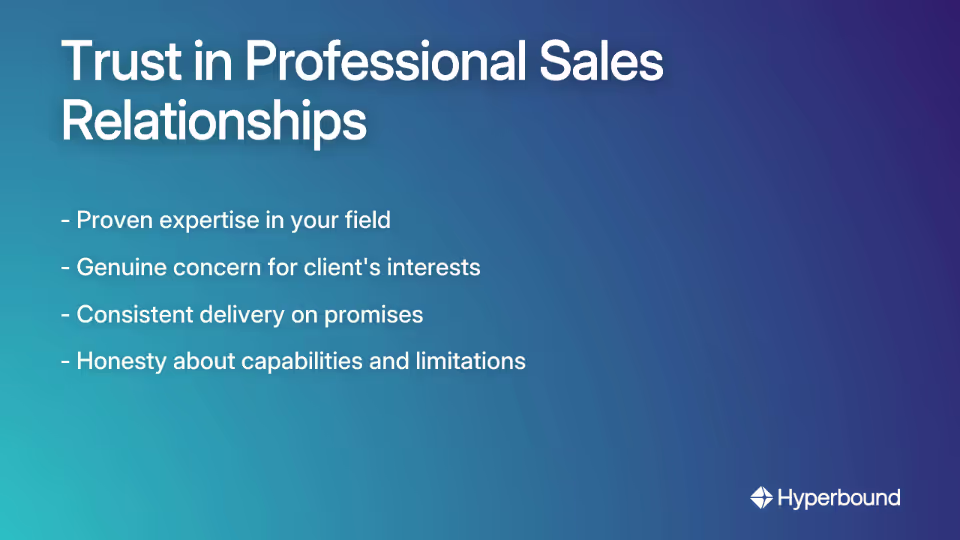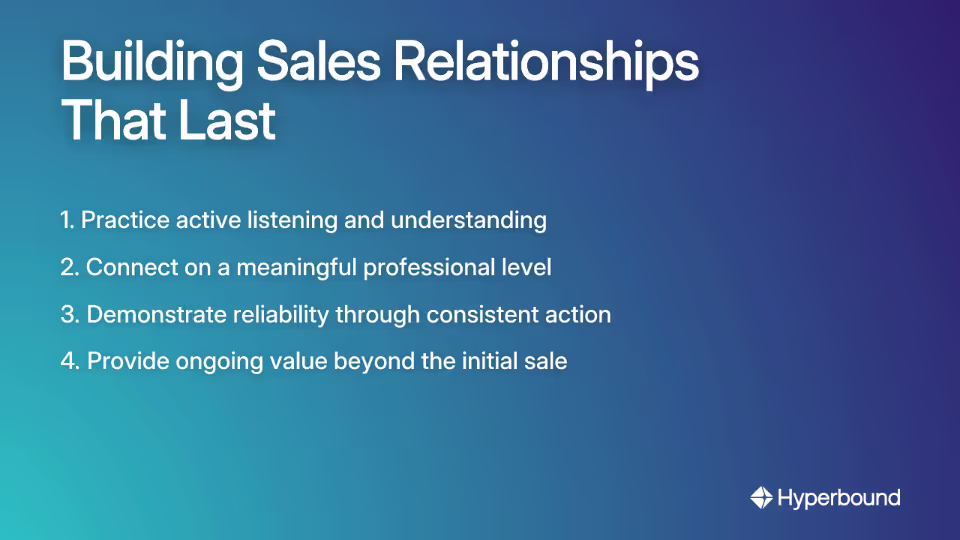
You've heard it a thousand times: "You need to build relationships with your prospects." This phrase has become so common in sales circles that it's practically a cliché. But here's the problem – despite how frequently this advice is dispensed, very few people can actually explain what it means.
Is it about becoming friends with your prospects? Getting them to like you? Taking them out for coffee or remembering their kids' names?
If you've ever felt confused by this vague directive, you're not alone. As one sales professional put it, "Building relationships seems to be something the sales echo-chamber bangs on about. The issue is not only does no one seem to be able to explain what this means consistently, it gets confused with people liking the sales person."
Let's cut through the noise and get specific about what relationship building in sales actually means – and more importantly, what it doesn't.
The Great Misconception: It's Not About Friendship
The biggest misconception about "building relationships" in sales is that it means becoming friends with your prospects. This misunderstanding leads many salespeople to prioritize being liked over being effective.
"So the sales person enters every interaction wanting to be liked rather than doing a good job," notes one sales veteran. This approach is fundamentally flawed.
Your prospects aren't looking for another friend. They're looking for someone who can solve their problems and deliver value. As harsh as it might sound, they don't want a relationship with someone who's primarily trying to sell them something.
What they do want is someone they can trust.

"You don't need to be liked to sell. You need to be trusted," explains an experienced sales professional. This distinction is crucial.
Trust in a professional context means your prospect believes you:
- Have their best interests at heart
- Will deliver on your promises
- Possess genuine expertise in your field
- Will be honest about capabilities and limitations
Can you be friendly while building this professional relationship? Absolutely. Should being liked be your primary goal? Absolutely not.
The Three Pillars of Professional Sales Relationships
Instead of chasing friendship, focus on building a relationship founded on these three essential pillars:
1. Credibility: Proving Your Expertise and Authority
Credibility is the combination of trust and authority, demonstrated through knowledge and reputation. Without it, you're just another salesperson making empty promises.
How to build credibility:
- Demonstrate deep industry knowledge: Don't just know your product; understand your prospect's industry. Discuss trends, challenges, and opportunities relevant to their business. This positions you as a consultative sales partner rather than just a vendor.
- Share specific success stories with metrics: Don't just claim your solution works; prove it with data. "We helped a similar company in your industry increase efficiency by 27% within three months" is far more powerful than "Our solution is really effective."
- Leverage social proof: Use testimonials, case studies, and referrals strategically. As human beings, we inherently trust something more when others have validated it first.
2. Honesty: The Foundation of Trust
In B2B sales especially, honesty isn't just an ethical choice—it's a strategic advantage that builds long-term relationships.
How to practice honesty:
- Tell the truth, always: If your offering isn't the right fit, say so. This may cost you a sale today, but it builds immense trust for tomorrow.
- Challenge the prospect (respectfully): "You earn trust by asking tough questions and challenging the prospect on their bs," notes one successful account management professional. This shows you're listening critically and focused on finding the right solution, not just any solution.
- Avoid overpromising: A common pitfall that erodes trust is overpromising and underdelivering. Be clear about what can and cannot be achieved, even if it means addressing difficult realities.
3. Value: Making Yourself Indispensable
The strongest professional relationships are built on consistent value delivery. Your goal should be to become so valuable that your customers can't imagine achieving their goals without you.
How to deliver value:
- Be a consultant, not a salesperson: Adopt a consultative approach focused on solving problems rather than pushing products.
- Add value beyond the sale: Provide helpful resources, make relevant introductions, or share industry insights—even when there's no immediate sale on the horizon.
- Personalize the experience: Use customer data to tailor communication and demonstrate you understand their specific needs. According to Adobe, 81% of consumers prefer brands that offer personalized experiences.

Context Matters: Transactional vs. Relational Sales
It's important to acknowledge that not all sales contexts require the same depth of relationship building.
In transactional sales (typically SMB, high-volume scenarios):
- The sales cycle is shorter
- Decision-making is simpler
- The focus is on speed and efficiency
- The "relationship" might be built over a single pleasant and effective call
As one salesperson puts it, "At the junior level it's less relationships and more transaction and volume. When you're in SMB or a transactional role, you don't care about your customers beyond are they going to buy, buy a lot, and buy quickly."
In relational/consultative sales (typically enterprise, key accounts):
- The sales cycle is longer
- Multiple stakeholders are involved
- The financial investment is significant
- Complex needs require sophisticated solutions
- Long-term partnerships are the goal
Here, deep relationship building becomes critical. Trust is paramount when deals involve significant risk and investment.
The principles of trust, credibility, and value remain the same across both contexts, but the application and depth change. Disregarding relationships entirely, even in transactional roles, can limit your career advancement. As one sales leader noted, "If you don't see the value of relationships, you'll be stuck in entry-level sales roles the rest of your career."
An Actionable Framework for Building Stronger Sales Relationships
Let's move from theory to practice with four concrete steps:
Step 1: Practice Active Listening
Active listening goes beyond hearing words—it's about understanding the meaning behind them. This fundamental soft skill is the foundation of relationship management.
- Paraphrase what customers tell you to confirm understanding: "So, if I'm hearing you correctly, your main challenge is..."
- Ask open-ended questions to gain deeper insights
- Take notes to demonstrate you value what they're saying
- Follow up on previous conversations to show continuity
- Utilize practice tools to refine your approach: AI coaching platforms like Hyperbound provide a safe environment to master active listening through realistic roleplays, ensuring you're prepared for any customer conversation.
Step 2: Connect on a Professional Level
This isn't about asking about their weekend. It's about establishing common ground related to their professional life.
- Research their company news and industry challenges
- Understand their role and specific responsibilities
- Identify mutual connections and professional interests
- Show your authentic self—passion for your industry is contagious
Step 3: Prove Reliability Through Action
In sales, actions speak louder than words. Every interaction is an opportunity to demonstrate trustworthiness.
- Do what you say you will do—every time
- Follow through on every commitment, no matter how small
- Respond promptly to calls and emails
- Be transparent about timelines and expectations
Step 4: Continue Providing Value After the Sale
The relationship doesn't end when the contract is signed. This ongoing engagement separates true trust advisors from mere vendors.
- Follow up post-sale to ensure satisfaction
- Provide ongoing support through the implementation process
- Share relevant updates, industry news, or insights
- Celebrate their successes and milestones

From Vendor to Partner: The Evolution of a Sales Relationship
"Building a relationship" in sales isn't a soft, unmeasurable concept. It's a strategic process with tangible business outcomes. It means shedding the goal of being liked and focusing relentlessly on:
- Earning trust through consistent delivery and honesty
- Establishing credibility through expertise and results
- Providing undeniable value that extends beyond your product
When successful, this approach transforms you from a vendor (easily replaceable) to a trusted partner (indispensable).
The benefits are substantial:
- Higher customer retention rates
- More warm leads through referrals
- Expanded opportunities within accounts
- Reduced price sensitivity
- Shortened sales cycles with repeat customers
The next time you're told to "build a relationship," don't think about making a friend. Think about building a partnership based on trust, value, and mutual success. Ask yourself: "How can I be so trustworthy, credible, and valuable that this client can't imagine achieving their goals without me?"
That is what building relationships in sales really means.
Frequently Asked Questions
What does "building relationships" in sales really mean?
Building relationships in sales means establishing yourself as a trusted, credible, and valuable partner, not just trying to become friends with your prospects. The goal is to move beyond a simple vendor-customer dynamic by earning your prospect's trust through demonstrated expertise, consistent honesty, and delivering value that solves their problems.
Why is trust more important than being liked in sales?
Trust is more important than being liked because clients make significant business decisions based on whether they believe you are a reliable expert who has their best interests at heart. While being likable is a bonus, trust convinces a client you will deliver on promises and possess genuine expertise, which is the foundation of a professional partnership.
How can a salesperson build credibility quickly?
You can build credibility quickly by demonstrating deep industry knowledge, sharing specific success stories with measurable results, and leveraging social proof like case studies or testimonials. Use concrete data and validated successes to position yourself as a knowledgeable consultant from the outset.
What is the difference between relationship building in transactional vs. enterprise sales?
Transactional sales are typically high-volume with short sales cycles where efficiency is key, while relational (or consultative) sales involve long cycles and complex needs where deep trust is essential. While the principles of trust and value apply to both, their depth and application differ based on the complexity of the deal.
How can I provide value beyond the sale itself?
You can provide value beyond the sale by acting as a consultant, sharing helpful resources, making relevant professional introductions, and continuing to engage after the contract is signed. Following up to ensure satisfaction and sharing relevant insights solidifies your role as a long-term partner, not a one-time vendor.
What is the first step to building better sales relationships?
The first and most fundamental step to building better sales relationships is practicing active listening. Active listening means truly understanding the prospect's needs, challenges, and goals. Practice this by paraphrasing what they say and asking insightful questions to show you value their input and build a foundation of trust.

Book a demo with Hyperbound
.png)













